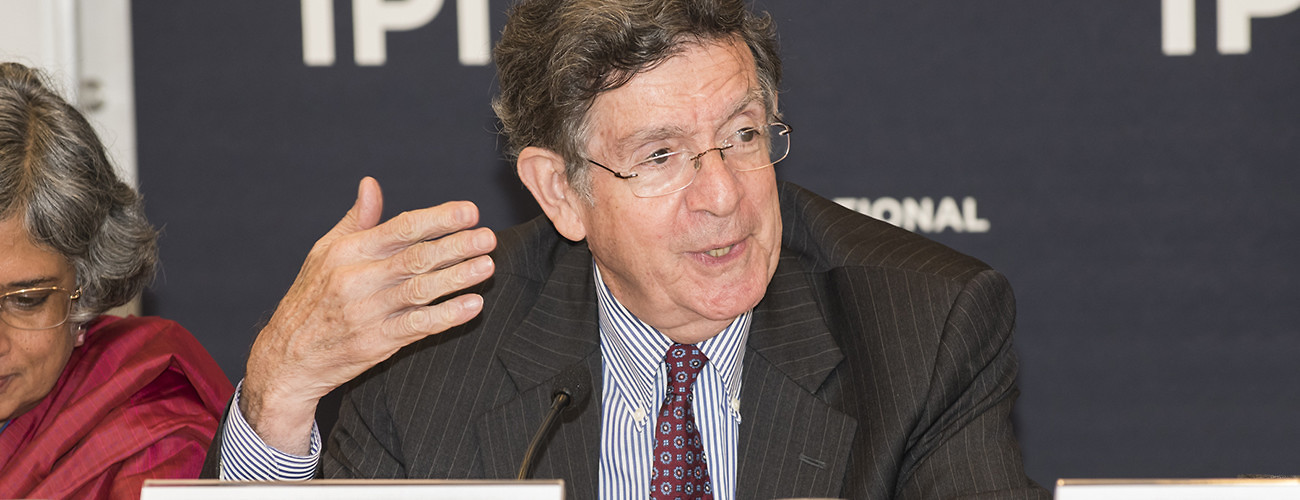Ambassador Gert Rosenthal told an IPI audience July 13th that a new review published that day had focused in on excessive “fragmentation” in UN peacebuilding activities.
Ambassador Rosenthal, who serves as Chair of the Advisory Group of Experts on the Review of the UN Peacebuilding Architecture, said the report proved “different parts of the organization are not working well together.”
Ambassador Rosenthal, a former Guatemalan Foreign Minister, learned much about the intricacies of the UN system through a long diplomatic career in which he served as the his country’s Permanent Representative to the UN from 1999-2004 and again in 2008-2014, when Guatemala was on the Security Council. He opened the panel discussion by stating, “The whole thrust of our report is to overcome the fragmentation, and introduce a little more coherence into the work of the house.”
Ambassador Rosenthal also made the point that funding for peacebuilding is inadequate. “It really is remarkable that we dedicate more than $8 billion a year for peace operations,” he said, “but we dedicate a small fraction of that for anything we call peacebuilding, so we would like to have a better balance.”
Anis Bajwa, a member of the advisory group, pointed out that peacebuilding, to be effective, must be sustained over a period of time after a conflict ends. “Just ensuring that the guns go silent is not enough for building peace,” he declared.
Explaining the choice of title for the report, “The Challenge of Sustaining Peace,” Mr. Bajwa emphasized the need to do more to prevent conflict. Peacebuilding is an activity of “the whole cycle of peace and conflict, and it should not be associated only with post-conflict situations,” he said. “That’s why we have preferred to call it ‘sustaining peace’ in our report, rather than just ‘building peace.’”
Asked whether the report dealt with enhancing women’s participation in peacebuilding, Saraswathi Menon, also a member of panel, answered, “The Peacebuilding Commission probably could do more in advocating gender equality, women’s rights, and women’s empowerment as part of national peacebuilding priorities.” She added that it was necessary for the Peacebuilding Commission to address “the impact of conflict on women, the contribution that women themselves make, and the need to address the specific needs of women and girls.”
The Peacebuilding Commission was created in 2005, and this assessment evaluates how the institutions are performing 10 years on. It also comes as many other high-level reviews are being conducted at the UN, for the organization’s 70th anniversary.
Oscar Fernandez-Taranco, UN Assistant Secretary-General for Peacebuilding Support, said that one area where peacebuilding had made progress was in its relationship with regional organizations. “Certainly last year, the Peacebuilding Commission, I think, stepped up quite significantly the relationship with the African Union,” he said, “and through that political relationship, also the substantive work that was going on, in actually addressing illicit transfer of funds, the issue of national revenue generation, etc.”
A key point made by all of the speakers was that different aspects of peacebuilding responsibilities lie across the UN system, with a myriad of departments. The General Assembly, the Security Council, the Economic and Social Council, and their subsidiaries, lack both the capacity and funding to communicate their shared responsibilities to each other in a way that might create informed, organization-wide planning for peacebuilding, the speakers argued.
That is why the Peacebuilding Commission has unique potential, as Ambassador Rosenthal described it. Looking ahead to the reform the commission should be contemplating, he said, “What we really need is for the Peacebuilding Commission to be able to fulfill the role of a bridge, which would bring together the peace, the human rights, and the development.”
IPI Senior Adviser Youssef Mahmoud moderated the conversation.
Watch event:








